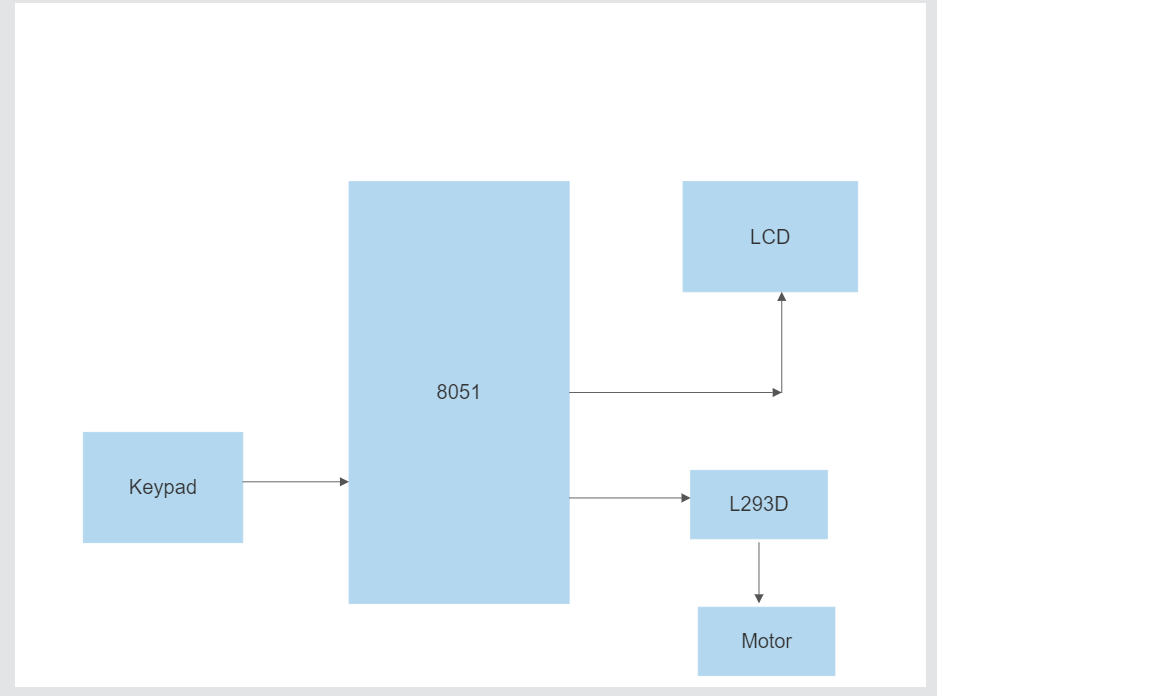This project was created using C language with Keil as the compiler and AT89C51 simulation as the microprocessor. This door system can detect the wrong and correct password and switch the motor off or on. This project was created using a calculator keypad instead as the desired letter keypad wasn't available in this version of proteus. However, there isn't much difference in the design and the code for both the design systems.
The objective of this project was to create a more robust, time-saving, safe and better solution to the traditional door locks(the keys and lock maneuver) that have high chances of burglary and therefore put the safety of the residents and people at risk.
The user enters the password through the keypad and the number pressed is stored and displayed number is kept hidden for privacy. The stored pin would be compared to the correct pin and see if the pin entered is correct or not and respond by switching the motor on or off. If the pin enterd is correct it displays the message "Correct Pin" and opens the door by switching on the motor and again displaying "Door Opened". And if the pin entered is wrong, the message displayed would be "Wrong pin".
- 1 x AT89C51
- 1 X CAP-ELEC
- 1 X CRYSTAL
- 1 X MOTOR
- 1 X RELAY
- 1 X RESPACK-8
- 1 X BUTTON
- 1 X L293D
- 1 X LM016L
- 1 X KEYPAD-PHONE
- 1 X MINRES10K
- 2 X 33pf CAP
The code for interfacing the hardware required for this project was written in Embedded C where the phone-keypad was interfaced to the microcontroller as the input whereas the LCD and Motor are interfaced as outputs to the microcontroller.
- LM016L- A 16 x 2 LCD display used in this project for displaying messages.
- L293D- A motor driver used to drive the motor in any direction and also control the speed of the motor. We use L293D to connect to the Motor.
- KEYPAD-PHONE- A keypad consisting of numbers and some special characters.
- RESPACK-8- An eight way resistor from common used for interfacing LCD.
- All the other components are used for crystal interfacing with AT89C51.
/* Main.c file generated by New Project wizard
*
* Created: Wed Jun 29 2022
* Processor: AT89C51
* Compiler: Keil for 8051
*/
#include <reg51.h>
#include <stdio.h>
/* row initialization */
sbit row1 = P1^3;
sbit row2 = P1^4;
sbit row3 = P1^5;
sbit row4 = P1^6;
/* column initialization */
sbit column1 = P1^2;
sbit column2 = P1^1;
sbit column3 = P1^0;
/*motor pin*/
sbit motor1 = P3^0;
sbit motor2 = P3^1;
/*led pins*/
sbit rs = P0^0;
sbit rw = P0^1;
sbit en = P0^2;
void lcddta (unsigned char);/* data command*/
void lcdisplay(unsigned char *k);/* display the messages*/
void lcdcmd(unsigned char);/*lcd command*/
void delay(unsigned int);/* delay command*/
char keypad();/* keypad interfacing*/
void check();/*check for the password*/
unsigned char pin[] ={"1234567"};/* the assumed password*/
unsigned char Lpin[7];/* the length of the assumed password*/
void main(){
lcdcmd(0x38);//5 x 7 mstrix selection command
lcdcmd(0x0e);//display on cursor blinking
lcdcmd(0x01);//clear screen
lcdcmd(0x06);//shift to cursor right
while(1){
unsigned int p = 0;
lcdcmd(0x80);//1st position for the cursor
lcdisplay("Enter Pin Number");//message to be displayed
delay(1000);
lcdcmd(0xc0);//next line
while(pin[p]!='\0'){
Lpin[p]=keypad();//array storing the user's pin
delay(1000);
p++;
};
check();
}//end of while
}//end of main
//delay function
void delay(unsigned int j){
int s, w;
for (s=0;s<j;s++){
for(w=0;w<10;w++){
}
}
}
//lcd commands function
void lcdcmd (unsigned char a){
P2=a;
rs=0;
rw=0;
en=1;
delay(1000);
en=0;
}
//lcd data function
void lcddta(unsigned char i){
P2=i;
rs=1;
rw=0;
en=1;
delay(1000);
en=0;
}
//lcd display function
void lcdisplay(unsigned char *k){
int q;
for(q=0;k[q]!='\0';q++){
lcddta(k[q]);
}
delay(1000);
}
//keypad function
char keypad(){
int x = 0;
while (x==0){
//assign values for first row
row1=0;
row2=1;
row3=1;
row4=1;
if(column1==0){
lcddta('*');
delay(1000);
x=1;
return '1';
}
if(column2==0){
lcddta('*');
delay(1000);
x=1;
return '2';
}
if(column3==0){
lcddta('*');
delay(1000);
x=1;
return '3';
}
row1=1;
row2=0;
row3=1;
row4=1;
if(column1==0){
lcddta('*');
delay(1000);
x=1;
return '4';
}
if(column2==0){
lcddta('*');
delay(1000);
x=1;
return '5';
}
if (column3==0){
lcddta('*');
delay(1000);
x=1;
return '6';
}
row1=1;
row2=1;
row3=0;
row4=1;
if(column1==0){
lcddta('*');
delay(1000);
x=1;
return '7';
}
if (column2==0){
lcddta('*');
delay(1000);
x=1;
return '8';
}
if (column3==0){
lcddta('*');
delay(1000);
x=1;
return '9';
}
row1=1;
row2=1;
row3=1;
row4=0;
if(column1==0){
lcddta('*');
delay(1000);
x=1;
return '*';
}
if (column2==0){
lcddta('*');
delay(1000);
x=1;
return '0';
}
if(column3==0){
lcddta('*');
delay(1000);
x=1;
return '#';
}
}
}
//check function
void check(){
if(pin[0]==Lpin[0] && pin[1]==Lpin[1] && pin[2]==Lpin[2 ]&& pin[3]==Lpin[3] && pin[4]==Lpin[4] && pin[5]==Lpin[5] && pin[6]==Lpin[6]){
lcdcmd(0x01);//clear screen
lcdcmd(0x80);//first line
lcdisplay("Correct Pin");
motor1 =1;//start the motor
motor2 = 0;
delay(1000);
lcdcmd(0xc0);//next line
lcdisplay("Door Opened");
delay(1000);
motor1=1;//stop the motor
motor2=1;
lcdcmd(0x01);
}else{
lcdcmd(0x01);
lcdcmd(0x80);
lcdisplay("Wrong Pin");
delay(1000);
lcdcmd(0x01);
}
}
Since this project was made with a 8051 microcontroller it cannot power high power devices. They are outdated, 8-bit and a bit slow. It can only perform a limited number of actions simultaneously. We need external circuitry for this microcontroller and also these do not have an in-built ADC and it has lesser frequency as compared to the other microcontrollers.
I do plan of improving the project by creating an alarm system that sounds an alarm after 5 (or any number) consecutive wrong attempts and also cretaing a modifiable password system where we can modify the password whenever we wish.

